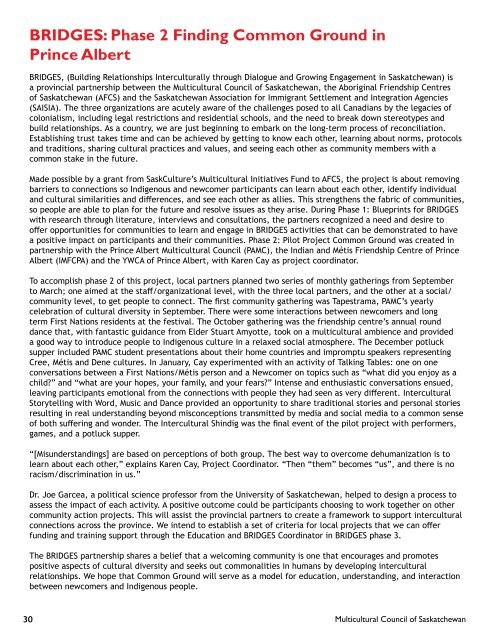ANNUAL REPORT 2015 - 2016
4BXF3fd3T
4BXF3fd3T
You also want an ePaper? Increase the reach of your titles
YUMPU automatically turns print PDFs into web optimized ePapers that Google loves.
BRIDGES: Phase 2 Finding Common Ground in<br />
Prince Albert<br />
BRIDGES, (Building Relationships Interculturally through Dialogue and Growing Engagement in Saskatchewan) is<br />
a provincial partnership between the Multicultural Council of Saskatchewan, the Aboriginal Friendship Centres<br />
of Saskatchewan (AFCS) and the Saskatchewan Association for Immigrant Settlement and Integration Agencies<br />
(SAISIA). The three organizations are acutely aware of the challenges posed to all Canadians by the legacies of<br />
colonialism, including legal restrictions and residential schools, and the need to break down stereotypes and<br />
build relationships. As a country, we are just beginning to embark on the long-term process of reconciliation.<br />
Establishing trust takes time and can be achieved by getting to know each other, learning about norms, protocols<br />
and traditions, sharing cultural practices and values, and seeing each other as community members with a<br />
common stake in the future.<br />
Made possible by a grant from SaskCulture’s Multicultural Initiatives Fund to AFCS, the project is about removing<br />
barriers to connections so Indigenous and newcomer participants can learn about each other, identify individual<br />
and cultural similarities and differences, and see each other as allies. This strengthens the fabric of communities,<br />
so people are able to plan for the future and resolve issues as they arise. During Phase 1: Blueprints for BRIDGES<br />
with research through literature, interviews and consultations, the partners recognized a need and desire to<br />
offer opportunities for communities to learn and engage in BRIDGES activities that can be demonstrated to have<br />
a positive impact on participants and their communities. Phase 2: Pilot Project Common Ground was created in<br />
partnership with the Prince Albert Multicultural Council (PAMC), the Indian and Métis Friendship Centre of Prince<br />
Albert (IMFCPA) and the YWCA of Prince Albert, with Karen Cay as project coordinator.<br />
To accomplish phase 2 of this project, local partners planned two series of monthly gatherings from September<br />
to March; one aimed at the staff/organizational level, with the three local partners, and the other at a social/<br />
community level, to get people to connect. The first community gathering was Tapestrama, PAMC’s yearly<br />
celebration of cultural diversity in September. There were some interactions between newcomers and long<br />
term First Nations residents at the festival. The October gathering was the friendship centre’s annual round<br />
dance that, with fantastic guidance from Elder Stuart Amyotte, took on a multicultural ambience and provided<br />
a good way to introduce people to Indigenous culture in a relaxed social atmosphere. The December potluck<br />
supper included PAMC student presentations about their home countries and impromptu speakers representing<br />
Cree, Métis and Dene cultures. In January, Cay experimented with an activity of Talking Tables: one on one<br />
conversations between a First Nations/Métis person and a Newcomer on topics such as “what did you enjoy as a<br />
child?” and “what are your hopes, your family, and your fears?” Intense and enthusiastic conversations ensued,<br />
leaving participants emotional from the connections with people they had seen as very different. Intercultural<br />
Storytelling with Word, Music and Dance provided an opportunity to share traditional stories and personal stories<br />
resulting in real understanding beyond misconceptions transmitted by media and social media to a common sense<br />
of both suffering and wonder. The Intercultural Shindig was the final event of the pilot project with performers,<br />
games, and a potluck supper.<br />
“[Misunderstandings] are based on perceptions of both group. The best way to overcome dehumanization is to<br />
learn about each other,” explains Karen Cay, Project Coordinator. “Then “them” becomes “us”, and there is no<br />
racism/discrimination in us.”<br />
Dr. Joe Garcea, a political science professor from the University of Saskatchewan, helped to design a process to<br />
assess the impact of each activity. A positive outcome could be participants choosing to work together on other<br />
community action projects. This will assist the provincial partners to create a framework to support intercultural<br />
connections across the province. We intend to establish a set of criteria for local projects that we can offer<br />
funding and training support through the Education and BRIDGES Coordinator in BRIDGES phase 3.<br />
The BRIDGES partnership shares a belief that a welcoming community is one that encourages and promotes<br />
positive aspects of cultural diversity and seeks out commonalities in humans by developing intercultural<br />
relationships. We hope that Common Ground will serve as a model for education, understanding, and interaction<br />
between newcomers and Indigenous people.<br />
30 Multicultural Council of Saskatchewan


